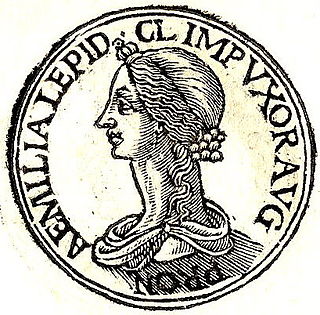Family
| |||
| Notes: |
Manius Aemilius Lepidus was a Roman senator who was active during the Principate. He was ordinary consul in AD 11 as the colleague of Titus Statilius Taurus. [1] Tacitus reports that Augustus, while discussing possible rivals for the Roman Emperor Tiberius on his deathbed, described him as worthy of becoming emperor (capax imperii), but "disdainful" of supreme power. [2]
Lepidus has been assumed to be the son of Marcus Aemilius Lepidus the Younger and his wife Servilia Isaurica, but modern-day historians believe he was more likely the nephew of Lepidus the Younger. He had a sister named Aemilia Lepida.
After 5 BC, but prior to acceding to the consulship, Lepidus was co-opted as an Augur. [3] He defended his sister at her trial in AD 20. At the trial of Clutorius Priscus, he argued without success that the proposed death sentence was excessively harsh. [4] [5] In AD 21, he achieved the pinacle of a Senatorial career, the proconsular governorship of Asia. [6]
Ronald Syme has argued, very cogently, that it was not Manius but Marcus Lepidus, consul in 6 BCE, who defended Clutorius Priscus, see Syme, R. (1955). Marcus Lepidus, Capax Imperii. The Journal of Roman Studies, 45, 22–33. https://doi.org/10.2307/298740
He had a daughter also called Aemilia Lepida who married Emperor Galba. [7]
| |||
| Notes: |

The gens Aemilia, originally written Aimilia, was one of the greatest patrician families at ancient Rome. The gens was of great antiquity, and claimed descent from Numa Pompilius, the second King of Rome. Its members held the highest offices of the state, from the early decades of the Republic to imperial times. The Aemilii were almost certainly one of the gentes maiores, the most important of the patrician families. Their name was associated with three major roads, an administrative region of Italy, and the Basilica Aemilia at Rome.
Decimus Junius Silanus Torquatus was a Roman senator who lived during the 1st century.
Paullus Aemilius Lepidus was a Roman senator.
Two noblemen, an uncle and nephew, who shared the name Lucius Junius Silanus Torquatus and were descendants of the Roman Emperor Augustus, lived during the 1st century AD.
Junia Lepida was a Roman noblewoman who lived in the first century.
Aemilia Lepida is a Latin feminine given name that was given to the daughters of various Aemilius Lepiduses, men belonging to the Lepidus branch of the Aemilia gens (family) that was founded by the Marcus Aemilius Lepidus who served as consul in 285 BC. The Aemila Lepidas who appear in Roman historians were principally known for their engagements and marriages, with those in the late Republic and early Empire related to the Julio-Claudian dynasty.
Gaius Rubellius Blandus was a Roman senator who lived during the Principate. Blandus was the grandson of Rubellius Blandus of Tibur, a member of the Equestrian class, who was the first Roman to teach rhetoric. He was suffect consul from August to December AD 18 with Marcus Vipstanus Gallus as his colleague. In AD 33, he married Julia Livia, granddaughter of the Roman emperor Tiberius.
Gaius Sallustius Passienus Crispus was a prominent figure in the Roman Empire during the first century. He held the consulship twice, and was stepfather of the future emperor Nero.
Cornelia was the daughter of Scribonia and her second husband. She was stepdaughter to Octavian through her mother's third marriage and half-sister to Julia the Elder, Augustus' only biological child.
Marcus Aemilius Lepidus was a patrician Roman senator, politician and general, praised by the historian Tacitus.
Mamercus Aemilius Scaurus was a Roman rhetorician, poet and senator. Tacitus writes that Scaurus was "a man of distinguished rank and ability as an advocate, but of infamous life." He was suffect consul from July to the end of the year AD 21, with Gnaeus Tremellius as his colleague.
Lucius Aemilius Paullus was the son of Paullus Aemilius Lepidus and Cornelia, the elder daughter of Scribonia. He was married to Julia the Younger, the eldest granddaughter of the Emperor Augustus.

Lucius Domitius Ahenobarbus was the son of consul Gnaeus Domitius Ahenobarbus and Aemilia Lepida. His mother was a paternal relative of the triumvir Marcus Aemilius Lepidus. His paternal grandmother was Porcia. Ahenobarbus married Antonia Major and through his son with her he became the grandfather of emperor Nero.
Clutorius Priscus was a Roman poet.

Aemilia Lepida was a noble Roman woman and matron. She was the first great-grandchild of the Emperor Augustus.
Marcus Junius D. f. M. n. Silanus was a Roman senator and consul in 25 BC as the colleague of Gaius Julius Caesar Octavianus, the emperor Augustus.
Marcus Junius Silanus Torquatus was a Roman senator. He was consul in AD 19, with Lucius Norbanus Balbus as his colleague.
Quintus Aemilius Lepidus was a Roman senator and military officer who was appointed consul in 21 BC as the colleague of Marcus Lollius.

The gens Sosia, occasionally written Sossia, was a plebeian family at ancient Rome. Members of this gens occur in history from the end of the Republic down to the third century AD. The first of the Sosii to attain the consulship was Gaius Sosius in 32 BC, and the family would continue holding various positions in the Roman state until the third century.
Vipsania was an ancient Roman noblewoman of the first century BC. She was married to the politician Marcus Aemilius Lepidus and was likely the daughter of Roman general Marcus Vipsanius Agrippa and his second wife Claudia Marcella Major.